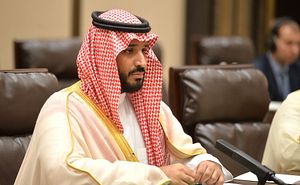The Pakistani government recently claimed that the Kingdom of Saudi Arabia may become the third major partner in the Beijing-funded, Belt and Road-linked, China-Pakistan Economic Corridor (CPEC)consisting of major infrastructure projects inside Pakistan. The announcement has come after Pakistani Prime Minister Imran Khan’s recent visit to Riyadh where he reportedly asked for the Kingdom’s financial assistance to shore up the country’s foreign reserves.
The idea of a third party joining the China-backed infrastructure initiative in Pakistan is not new: A number of other countries including Iran and the United States were also made similar offers by Islamabad. While Washington and Tehran didn’t join the project, Riyadh’s announcement of support to become part of the CPEC has emerged as an interesting case.
If the Saudi leadership decides to follow through with their plan of investing in the CPEC, this would the first of its kind major investment, where the former has actually acquired stakes in Pakistan’s economy. This is a major shift in terms of Riyadh’s foreign policy toward Pakistan.
Historically, the Saudi leadership has always offered Pakistan financial assistance whenever the country got into an economic crisis of its own making. During the 1990s, Riyadh gave Pakistan subsidies in oil imports and offered liquidity to help Islamabad survive Washington-led sanctions on the country.
The period following the 9/11 attacks in the United States also saw Riyadh standing with Pakistan in case the country was in any sort of financial jeopardy. In response to Riyadh’s assistance, Pakistan has always offered military support to the former in fighting terrorism, training troops, and defending the Kingdom’s security. In the past, Islamabad has directly deployed troops in Riyadh to help shore up Saudi forces in the Kingdom.
However, the cooperation in the area of security has seen some changes over the past few years, with Pakistan having become reluctant from openly joining the Kingdom militarily. In 2015, Pakistan refused to send troops to Yemen where Saudi Arabia is involved in a major military conflict.
While Pakistan is a part of a Saudi led 34-state Islamic military alliance, the country doesn’t want to be embroiled in any sectarian conflict anymore by openly supporting a “Sunni military block” which may engender serious security troubles for Pakistan domestically. The last three decades have seen Pakistan facing one of the most challenging sectarian crisis domestically, which has partially been a result of Islamabad’s poorly conducted foreign policy, particularly the country’s ability to balance its relationship with Iran and Saudi Arabia.
This change of approach in Pakistan was not well received in Islamist countries where Riyadh has significant influence. On Pakistan’s decision to stay neutral in the ongoing conflict in Yemen and Syria, the United Arab Emirates (UAE) said that Pakistan’s decision to not join the Saudi-led coalition was “dangerous and unexpected.” Moreover, the UAE termed Pakistan’s choice of staying neutral in Yemen as akin to supporting Iran’s interests in the region.
There are two reasons why Riyadh may be interested in now investing in Pakistan.
One, the Kingdom’s decision to invest in an infrastructure project would surely offer it significant stakes in the Pakistani economy. Additionally, the new leadership in Riyadh doesn’t want to deteriorate ties with Pakistan as the former may still expect Islamabad’s military support in case of any future domestic security challenge.
Two, the new approach of giving funds in the form of investments rather than loans mean that the Kingdom is not going to offer financial assistance to Islamabad that doesn’t bolster its influence in the country further. For Riyadh, the decision to join CPEC will not only generate financial returns in the long-run, but will also strengthen its foothold in the region.
On the other hand, for Pakistan, the incoming investments from Riyadh will give it much-needed financial assistance to shore up its economic reserves. Apparently, both countries are entering an era where economic and security calculus is becoming important rather than just an ideological alignment of ties. Moreover, it’s encouraging that Riyadh doesn’t appear to be pushing Pakistan to break its working relationship with Iran, which is a clear divergence from its previous policy.
Pakistan and Saudi Arabia’s bilateral relationship may be entering a new era in which security and economic cooperation are at the core.

































